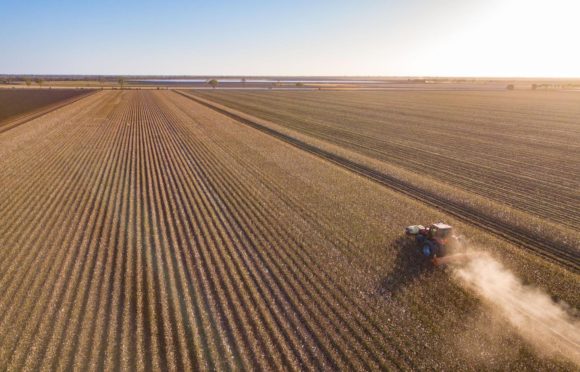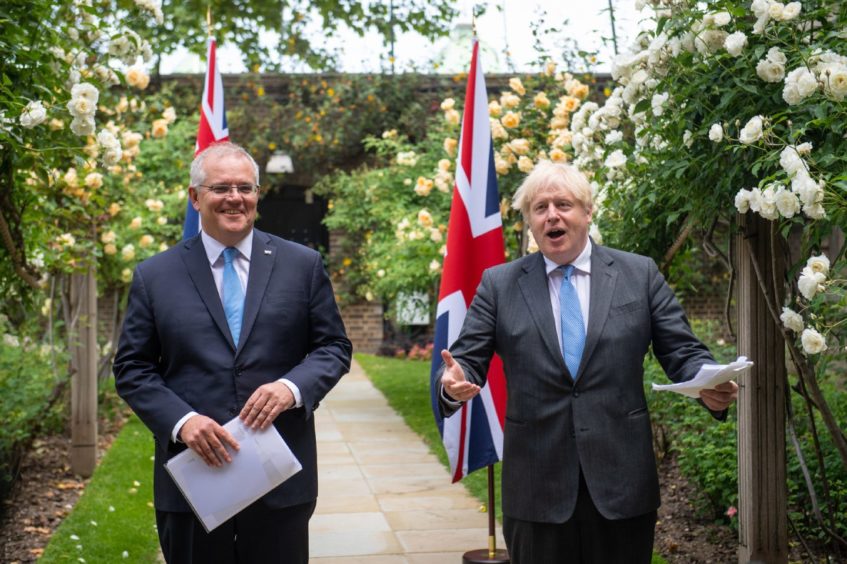The bestselling airport book The Dry sets a crime mystery in the Australian outback amid a long drought.
The only reliable supply of liquid refreshment is the bar, run by a Scotsman.
Author Jane Harper probably didn’t mean this as metaphor, but it sums up the environmental folly of the UK Australia trade deal.
A country on the other side of the world with barely any water will raise sheep and make wine for consumption in Scotland.
The dry world will export its limited water reserves in the form of animal flesh and booze to the wet world. It’s insane.
Fantastic free trade deals – but what about the environment?
Boris Johnson hailed the new free trade deal as “fantastic”, saying it opened up opportunities for consumers and business. He projected a vision of British backpackers roaming free in the outback while we feasted on Australian meat.
Here though, farming unions are worried local produce will be undercut by lower grade imports, while business organisations have raised concerns about the lack of detail in the deal.
For Johnson, this is what the future looks like. It is the Brexit dividend. Free trade deals with fewer restrictions than EU ones which allow Britain to become a global powerhouse.
None of this factors in the environmental impact. Which is odd, given Johnson’s new commitment to tackling climate change.
He pressed for radical investment in a “Marshall Plan” to decarbonise the developing world at the recent G7 summit.
As global leaders gather in Glasgow later in the year for COP26, we can expect a lot of posturing on green issues.
It’s worth noting then that the independent Climate Change Committee (CCC) reported yesterday that the UK is woefully unprepared for the risks ahead, while Scotland yet again missed its carbon reduction targets.
Water is everything
Water is inextricably wrapped up in this.
We need to understand that money and trade are underpinned by water. It sounds frivolous at first, but it’s deadly serious.
The control of water is the essence of civilisation. You can only have cities if you can get clean water in and dirty water out.
Every item around us involves water in its growth or manufacture. We live in a hydro economy. We just don’t recognise this – much in the way we didn’t appreciate the carbon economy until the late 20th century. Now, we assess much of what we do and make according to its carbon emissions.
The trouble is that modern standards of living are suited to wet countries – lots of stuff, cheap food, green lawns
The hydro economy works by diverting and damming rivers and drilling for underground water and absorbing this into material stuff which is then shipped around the world. Global trade is the business of value-added water.
The changing climate affects all of us – even in ‘wet’ countries
The environmental problem is this. When too much water is extracted from a local climate, you get more droughts and higher temperatures.
That is bad for the environment, desperate for farmers and people, and it increases energy consumption – in the form of more air con and more goods shipped in.
Ideally, each region would consume water according to its supply. That’s good for wet countries, but means dry places have to be more cautious. The trouble is that modern standards of living are suited to wet countries – lots of stuff, cheap food, green lawns.
This global trade in water to match western standards in dry places currently only works because ground water is exploited. That’s why dry countries like Morocco grow tangerines for our fruit bowls.
The problem is that ground water is running low and new climate patterns mean weather patterns are changing which means rain falls in new, “wrong” places.
Control the water market, control climate change
At the moment, free trade and climate change are disconnected. Politicians can be in favour of both, without repercussion. That era is ending.
Countries with exhausted water supplies see social breakdown and become unstable
The new reality is that water resources in the origin country are paramount. If we need a Marshall Plan to decarbonise, then something even greater is called for to moderate the water trade.
Existing economic models mean dry countries make money by selling their water to richer, wetter countries. That is crazy, unsustainable and ultimately dangerous.
Countries with exhausted water supplies see social breakdown and become unstable. It’s in everyone interest to think in terms of water justice.
When farmers worry about Scottish lamb being rejected in favour of Australian meat, we should all be concerned about the wider significance of this. Decode what appears to be a small row from a few special interests and you have a huge issue about life on this planet.
It is a matter for which protectionism is probably the answer – protect your fresh water, trade after that.
The issue is in its infancy as a political matter, but that won’t long be the case. Unless you can control the water market, you’ll never control climate change.
We could be facing last orders globally
The CCC warns that politicians can’t compute the need to act now to deflect a risk years hence. We are all too short term.
The problem is that free trade with Oz actively makes the problem worse and the risk greater.
Scots are lucky, running a bar full of water and whisky. Our climate is a blessing.
But we really do not want to live in a world which is mainly dry. Then it’s last orders for everyone.
Alex Bell is the author of Peak Water: How We Built Civilisation on Water and Drained the World Dry


